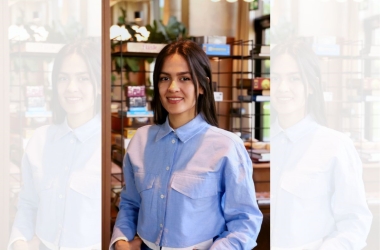Exploring Neuromarketing’s Impact on YouTube Advertising for Generation Z

Techniques like eye tracking and facial coding could be key to engaging Gen Z on YouTube
Wittenborg student Nafiseh Fayyaz recently completed an insightful graduation project that explores how neuromarketing can enhance YouTube advertising strategies for Generation Z. Her study, which involved interviews with various marketing professionals, provides fresh perspectives on how to engage the younger generation in the digital advertising landscape.
Originally from Iran, Nafiseh pursued an EBA (Entrepreneurial Business Administration) with a specialisation in Entrepreneurship & Small Business at Wittenborg. Her choice of research topic was quite personal. “As a member of Generation Z, I’ve always been fascinated by how our generation responds to advertising,” Nafiseh shares. “I'm excited to delve into neuromarketing's role in understanding our behaviour and its potential impact on advertising strategies."
For her research project, Nafiseh defines neuromarketing as using neural processes like attention, emotions and memory to enhance advertising effectiveness. Techniques include measuring brain activity and physiological responses to predict purchasing decisions and optimise marketing strategies.
She proceeded to use a qualitative research approach, interviewing marketing and neuromarketing professionals. "Access to neuromarketing techniques and finding experts to interview were significant challenges,” Nafiseh explains. “However, the interviews provided me with insights into how neuromarketing can transform advertising for Gen Z.”
Through her research, she discovered that advanced neuromarketing methods like Functional Magnetic Resonance Imaging (fMRI) and Electroencephalography (EEG) are crucial for understanding consumer behaviour. “fMRI helps us delve into subconscious emotions, while EEG offers insights into immediate reactions to content,” she explains. “Techniques like eye tracking reveal what captures attention and facial coding shows emotional responses.”
Key findings and recommendations
Nafiseh’s study ultimately revealed several key trends and practical recommendations for marketers targeting Gen Z on YouTube:
Personalisation is key
Nafiseh found that Gen Z responds best to personalised and emotionally engaging content. “Gen Z prefers ads that feel authentic and connect with them on an emotional level,” she says. “They are quick to ignore traditional ad formats, so marketers must be creative and innovative.”
Use of advanced neuromarketing techniques
Her research underscores the importance of using advanced neuromarketing tools to gain deeper insights into consumer behaviour. “Techniques like fMRI and EEG can help create more effective and engaging ad content for Gen Z,” Nafiseh recommends. “These tools offer a deeper understanding of how ads affect viewers on a subconscious level.”
Stay agile and responsive
Nafiseh also emphasises the need for marketers to be adaptable. “Marketers should continuously monitor and adjust their strategies based on real-time feedback from neuromarketing techniques,” she advises. “This agility will help them stay ahead of changing consumer preferences and trends.”
Looking ahead
With her graduation project successfully completed, Nafiseh is excited about her future career in marketing. “I look forward to applying the innovative approaches I explored in my research to real-world marketing challenges,” she says. “I aim to gain practical experience and contribute to developing more effective marketing strategies.”
Nafiseh is also enthusiastic about the future of YouTube advertising. “I believe we will see a shift towards more personalised, immersive advertising experiences,” she predicts. “Interactive content, augmented reality (AR), and virtual reality (VR) will become central to engaging Generation Z in meaningful ways.”
Advice for future students
Nafiseh’s advice for students working on their theses is both practical and inspiring. “Choose a topic you are genuinely passionate about,” she recommends. “Your enthusiasm will not only make the process more enjoyable but will also drive you to produce insightful and meaningful work.”
WUP 12/09/2024
by Erene Roux
©WUAS Press